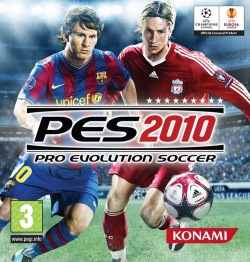
FIFA is a discontinued football video game franchise developed by EA Vancouver and EA Romania and published by EA Sports. As of 2011, the FIFA franchise has been localized into 18 languages and available in 51 countries. Listed in Guinness World Records as the best-selling sports video game franchise in the world, the FIFA series has sold over 325 million copies as of 2021. On 10 May 2022, it was announced that EA and FIFA's partnership of 30 years would come to an end upon the termination of their licensing agreement, making FIFA 23 the last entry to the franchise under the FIFA name. As a successor to the FIFA series, EA launched the EA Sports FC franchise, with EA Sports FC 24 being the first installment under the new name.

Pro Evolution Soccer 3 is a football simulation video game developed and produced by Konami as part of the Pro Evolution Soccer series. Initially released for the PlayStation 2, it is also the first in the series to be released on Microsoft Windows.
The UEFA Champions League video game license has been used by five different companies. Debuted in 1996, the series has only had five games published so far, and after being in the hands of Krisalis Software, Silicon Dreams Studio and Konami, the license now lies in the hands of EA and Sega.
FIFA has licensed FIFA World Cup video games since 1986, of which only a few were received positively by the critics, but given the popularity of the competition, they all did positively on the market, and the license is one of the most sought-after. Originally in the hands of U.S. Gold, Electronic Arts acquired it in 1997 and is the current holder.
The UEFA European Championship has its own video games licensed from European football's governing body, UEFA. Six games have been released so far, with the first game released in 1996. Originally held by Gremlin Interactive, it was then held by Electronic Arts from Euro 2000 until Euro 2012. Konami have had the rights since Euro 2016.

Pro Evolution Soccer 2, also known as World Soccer: Winning Eleven 6 outside of Europe, is the second installment of Konami's Pro Evolution Soccer football simulation video game series. The Japanese release was succeeded by an updated and improved version called World Soccer: Winning Eleven 6 Final Evolution.

Pro Evolution Soccer 6, known as Winning Eleven: Pro Evolution Soccer 2007 in the United States, is a video game developed and published by Konami. Released in 2006 for the PlayStation 2, Xbox 360, and Microsoft Windows platforms and following on the Nintendo DS and PlayStation Portable afterward, Pro Evolution Soccer 6 is the 6th edition of the Pro Evolution Soccer series for the PlayStation 2, 2nd for the PlayStation Portable and 4th for Microsoft Windows. It is the first game to debut on the Nintendo DS and the Xbox 360. The Xbox 360 version features improved graphics, but retains gameplay similar to the other console versions. The edit mode has been stripped down for the Xbox 360 release, due to time restrictions. The graphics engine on the PC does not utilise the next-gen 360 engine but will again be a direct conversion of the PlayStation 2 engine.

Pro Evolution Soccer 2008, known as World Soccer: Winning Eleven 2008 in Asia and sometimes called World Soccer: Winning Eleven 11 (PS2) in North America, is an association football video game in the Pro Evolution Soccer series by Konami. The game was announced on 18 June 2007. Its title is different from the other Pro Evolution Soccer games in that it is of a year and not a version; this was due to EA Sports' FIFA series naming their titles with two digit numbers and in conclusion would seem that PES was a year behind FIFA. It was released for Windows, Wii, Nintendo DS, PlayStation 3, PlayStation 2, PlayStation Portable, Xbox 360 And mobile. The game sold 6.37 million units worldwide. PES 2008 was succeeded by Pro Evolution Soccer 2009. This was the first game of the series to be released for the PS3 and Wii, as well as the first game in the series to be internationally available on a Nintendo home console.

Pro Evolution Soccer 2009 is a football video game in the Pro Evolution Soccer series, which was made by Konami. It is also the exclusive licensed game of the UEFA Champions League. The Wii version is known as Winning Eleven Play Maker 2009 in Japan. PES 2009 was succeeded by Pro Evolution Soccer 2010.

Pro Evolution Soccer 2010 is the ninth football video game in the Pro Evolution Soccer series. The game was developed and published by Konami for release on Sony's PlayStation 2, PlayStation 3, and PlayStation Portable; Microsoft's Xbox 360 and Windows; Nintendo's Wii; and mobile phones.

Pro Evolution Soccer 2011 is an association football video game in the Pro Evolution Soccer series developed and published by Konami. It was released in 2010–2011. The UEFA Champions League and UEFA Europa League are featured within the game, and for the first time in the series, UEFA Super Cup and CONMEBOL's Copa Libertadores are fully licensed. PES 2011 was succeeded by Pro Evolution Soccer 2012.

Pro Evolution Soccer 2012 is a video game which is the eleventh edition in the Pro Evolution Soccer series developed and published by Konami. Lionel Messi, who was the cover star for the series since PES 2009, was replaced by PES 2008 cover star Cristiano Ronaldo, while Borussia Dortmund player Shinji Kagawa replaces Messi as the cover star for the Japanese release. The US and Latin American cover features Santos player Neymar and Cristiano Ronaldo.

Pro Evolution Soccer 2013 is an association football video game, developed and published by Konami. The game was announced by Konami on April 18, 2012. For the first time of the series, all 20 teams from the Brazilian national league, Campeonato Brasileiro Serie A, are included in the game series. The UEFA Champions League and UEFA Europa League features in the game. PES 2013 was the last game in the series available on a Nintendo home console and was succeeded by Pro Evolution Soccer 2014.

eFootball Pro Evolution Soccer, known as eFootball World Soccer Winning Eleven in Japan, is a series of association football simulation video games developed by Konami Digital Entertainment Co., Ltd. and published by Konami.

Pro Evolution Soccer 2015 is a football simulation game developed by PES Productions and published by Konami for Microsoft Windows, PlayStation 3, PlayStation 4, Xbox 360, and Xbox One. It is the fourteenth edition of the Pro Evolution Soccer series. The cover of the game features Mario Götze of Bayern Munich. In this game, the slogan used was The Pitch is Ours for the first time. PES 2015 was followed by Pro Evolution Soccer 2016.

Pro Evolution Soccer 2016 is a football simulation game developed by PES Productions and published by Konami for Microsoft Windows, PlayStation 3, PlayStation 4, Xbox 360, and Xbox One. It is the fifteenth edition of the Pro Evolution Soccer series and marks PES Productions' 20th year of producing football games. Marketed with the slogan of "Love The Past, Play The Future", The cover of the game features Neymar Jr. The name of the game has been changed from "World Soccer: Winning Eleven" to "Pro Evolution Soccer" in Asia, except Japan where it is titled "Winning Eleven". PES 2016 was succeeded by Pro Evolution Soccer 2017.

Pro Evolution Soccer 2017 is a sports video game developed by PES Productions and published by Konami for Microsoft Windows, PlayStation 3, PlayStation 4, Xbox 360, Xbox One, Android and iOS. The game is the 16th installment in the Pro Evolution Soccer series. It was released in September 2016 and is compatible with PS4 Pro console.

Pro Evolution Soccer 2018 is a sports video game developed and published by Konami for Microsoft Windows, PlayStation 3, PlayStation 4, Xbox 360, Xbox One, Android and iOS. The game is the 17th installment in the Pro Evolution Soccer series and was released worldwide in September 2017. This was the final PES game released for PlayStation 3 & Xbox 360 consoles and the last to feature UEFA Champions League, UEFA Europa League, and UEFA Super Cup licenses and the Borussia Dortmund partnership.

Pro Evolution Soccer 2019 is a football simulation video game developed by PES Productions and published by Konami for Microsoft Windows, PlayStation 4, and Xbox One. It is the 18th installment in the PES series and was released on 28 August 2018 in North America and on 30 August 2018 in Japan, Europe, and Australia. During that time, Philippe Coutinho, as a winger for FC Barcelona, appeared on the cover of the standard edition, while David Beckham appeared on the front cover of the legend edition. Scottish clubs Celtic and Rangers have been brought to the game along with their stadiums, such as the Old Firm derby. This was the final installment in the franchise to be branded as just PES, following the decision to rebrand it eFootball Pro Evolution Soccer, starting with the 2019 edition, EFootball PES 2020, and then just simply as eFootball.

eFootball PES 2020 is a football simulation video game developed by PES Productions and published by Konami for Microsoft Windows, PlayStation 4, Xbox One, Android, and IOS. The game is the 19th installment in the eFootball Pro Evolution Soccer series and was launched worldwide on 10 September 2019 and in Japan on 12 September 2019.

















